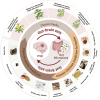Innovative strategies for post-stroke depression: integrating traditional Chinese medicine with neurobiological insights, including the gut-brain axis
- PMID: 40529498
- PMCID: PMC12170650
- DOI: 10.3389/fphar.2025.1539357
Innovative strategies for post-stroke depression: integrating traditional Chinese medicine with neurobiological insights, including the gut-brain axis
Abstract
Post-stroke depression (PSD) is a debilitating condition affecting more than one-third of stroke survivors, leading to significant impairments in mood, cognitive function, and overall quality of life. While conventional treatments like selective serotonin reuptake inhibitors (SSRIs) are commonly used, their efficacy is often limited, and they are associated with adverse side effects. Emerging research underscores the critical roles of neuroinflammation, neurotransmitter imbalances, and disruptions in the gut-brain axis in the development and progression of PSD, suggesting that targeting these pathways could lead to more effective therapeutic outcomes. Traditional Chinese Medicine (TCM) presents a promising multi-faceted approach, addressing these complex biological mechanisms by regulating neurotransmitter systems, modulating immune responses, and restoring gut microbiota balance. Key herbs such as Salvia miltiorrhiza Bunge (Lamiaceae; Dan Shen) and Bupleurum chinense DC. (Apiaceae; Chai Hu) have shown significant potential in modulating neurotransmitter levels, reducing neuroinflammation, and providing neuroprotection. Additionally, TCM formulations like Chaihu Shugan Powder (CSP) and Shugan Jieyu Capsules (SG) further enhance these effects by promoting gut microbiota homeostasis and restoring metabolic balance. This review delves into the biological mechanisms underlying PSD, with a particular focus on neuroinflammation, neurotransmitter dysregulation, and gut-brain axis dysfunction. It also explores the potential of integrating TCM with advanced multi-omics technologies-such as metabolomics, metagenomics, and transcriptomics-to develop personalized treatment strategies for PSD. By combining the holistic principles of TCM with modern Western medicine and cutting-edge omics technologies, this integrative approach offers a comprehensive framework for managing PSD, with the potential to significantly improve recovery outcomes and enhance the quality of life for stroke survivors.
Keywords: gut-brain axis; neuroinflammation; neurotransmitter; post-stroke depression (PSD); traditional Chinese medicine (TCM).
Copyright © 2025 Zhu, Han, He, Pan, Zhong, Li and Liu.
Conflict of interest statement
The authors declare that the research was conducted in the absence of any commercial or financial relationships that could be construed as a potential conflict of interest.
Figures
Similar articles
-
Gut Microbiota-Targeted Therapeutics for Metabolic Disorders: Mechanistic Insights into the Synergy of Probiotic-Fermented Herbal Bioactives.Int J Mol Sci. 2025 Jun 7;26(12):5486. doi: 10.3390/ijms26125486. Int J Mol Sci. 2025. PMID: 40564947 Free PMC article. Review.
-
Integrating Gut Microbiome and Metabolomics with Magnetic Resonance Enterography to Advance Bowel Damage Prediction in Crohn's Disease.J Inflamm Res. 2025 Jun 11;18:7631-7649. doi: 10.2147/JIR.S524671. eCollection 2025. J Inflamm Res. 2025. PMID: 40535353 Free PMC article.
-
From traditional medicine to modern medicine: the importance of TCM regulatory science (TCMRS) as an emerging discipline.Chin Med. 2025 Jun 26;20(1):92. doi: 10.1186/s13020-025-01152-8. Chin Med. 2025. PMID: 40563101 Free PMC article. Review.
-
Prophylactic administration of Xuesaitong soft capsule ameliorating depression-like behaviors in rats after ischemic stroke by modulating metabolic disturbance.Phytomedicine. 2025 Sep;145:156997. doi: 10.1016/j.phymed.2025.156997. Epub 2025 Jun 16. Phytomedicine. 2025. PMID: 40570557
-
Citri Reticulatae Pericarpium modulates gut microbiota: Impacts on human health.Food Res Int. 2025 Oct;217:116745. doi: 10.1016/j.foodres.2025.116745. Epub 2025 Jun 10. Food Res Int. 2025. PMID: 40597475 Review.
References
-
- Badini I., Coleman J. R. I., Hagenaars S. P., Hotopf M., Breen G., Lewis C. M., et al. (2022). Depression with atypical neurovegetative symptoms shares genetic predisposition with immuno-metabolic traits and alcohol consumption. Psychol. Med. 52 (4), 726–736. 10.1017/S0033291720002342 - DOI - PMC - PubMed
Publication types
LinkOut - more resources
Full Text Sources
Miscellaneous





